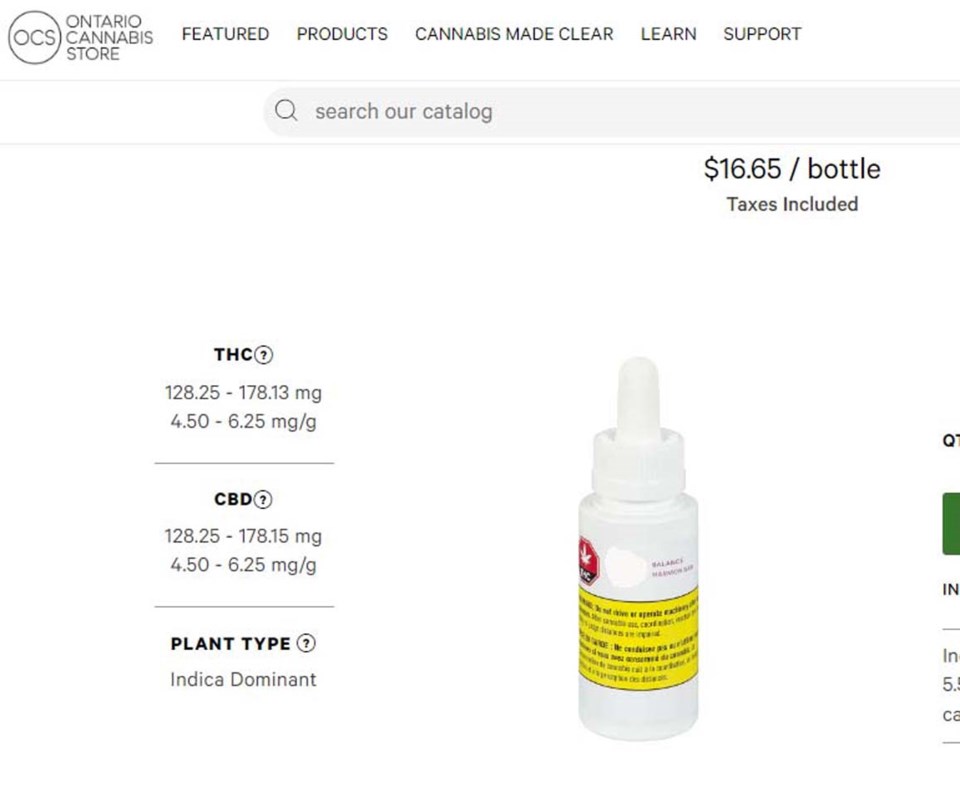Levels of THC in cannabis oils sold by the Ontario Cannabis Store — compared to the amounts identified on product labels — were wrong outside the variance allowed by federal cannabis regulations in 40 per cent of samples, a study at McMaster University showed.
Researchers bought 30 different oil products online from the Ontario Cannabis Store (OCS), the government-owned monopoly cannabis wholesaler and online retailer, and analyzed them in a lab.
One sample contained 120 mg more THC than the label indicated.
Their findings were reported in the Journal of the American Medical Association.
Tetrahydrocannabinol, or THC, is the main psychoactive chemical in cannabis.
About 20 per cent of cannabis users overall — including both medical and recreational users — use cannabis oil, federal surveys show. However, about half of medical users reported using oil. Oil was widely available to medical users before legalization.
Medical users may well be trying to find a level of THC that will deal with symptoms, but be low enough to avoid intoxication as they go about their daily lives. Incorrect labelling of THC could lead to "inaccurate dosing," the researchers noted. This could be a problem if, for example, a person decides they have reached their ideal dose based on an incorrect label and goes on to overconsume with a correctly labelled product, or vice versa.
Reports show that since legalization, many medical users seem to have found it simpler to buy cannabis from the recreational market.
"It is worth noting that none of the products we tested contained greater amounts of THC than on the label at any level that would be expected to have different psychoactive effects," study co-author Amanda Doggett wrote in an e-mail. "This was a positive finding, because it meant there were no public safety concerns with any of the products we tested."
"The present issue for individuals using cannabis for medical purposes is that labelling discrepancies may make it difficult to find or maintain an ideal dose, given that our study demonstrated that product-to-product the THC and CBD content is sometimes over-labelled," Doggett added.
It's not clear whether the oils were shipped from the maker with incorrect values, or whether changes happened after that. There is evidence that aluminum can liners can absorb THC.
The authors did not suggest a reason for the discrepancies.
"Obviously a key concern is that producers are purposely inflating THC values (and there are paths to do this within regulations, for example by sending in the most potent sample from a batch of cannabis for testing), but we can’t say that’s why the discrepancies occurred in this study," Doggett wrote.
"What I can say is that all of our samples were tested prior to their expiry date, and were stored appropriately at room temperature, so our test results are an accurate reflection of the product as a consumer would receive it, and thus we would expect the labels to be accurate within the regulatory limits."
In a third of cases, the study also found discrepancies between the stated amounts of CBD and THC for products on the OCS's website and the amounts on product labels once they actually arrived.
The authors will not be releasing the brands involved, Doggett said.
"I can tell you we had many brands in the sample of 30 products and the discrepancies were not limited to just one or a few brands."
Among the higher-potency products, nearly half were incorrectly labelled as containing THC amounts that were greater than what was indicated by laboratory testing by more than 15%.
"Our findings suggest that inaccurate labelling of cannabis oil products in the legal Canadian market is common," the authors wrote. "Given that many medical consumers obtain products from the non-medical market, one implication is inaccurate dosing. Altogether, these findings suggest a need for greater quality control in the Canadian legal cannabis market and undermine the assumption that a legal market is an assurance of accurate labelling."
The Société québécoise du cannabis (SQDC), the Quebec equivalent of the OCS, does do product testing. A request for the lab results under that province's FOI law was rejected on appeal on a technicality in 2021. In the appeal, eight national cannabis companies joined the SQDC's efforts to stop the release of the documents.
However, the OCS sees testing as the responsibility of the cannabis companies, and, failing that, the federal government.
"Health Canada regulations require that licensed producers establish strict quality assurance and testing procedures for cannabis products and comply with variability limits of THC values for cannabis oils," spokesperson Amanda Winton wrote in an email. "It remains OCS’s expectations that its suppliers adhere to these and all Health Canada requirements."
"Variances between stated and tested cannabinoid levels may occur due to different validation methods employed by various third-party testing laboratories," Winton added. "In its response to Health Canada’s legislative review of the Cannabis Act and Cannabis Regulations, the OCS recommended that Health Canada enhance quality controls to ensure ongoing consumer confidence in legal cannabis products."
The LCBO, by contrast, has a large product testing lab which runs over 600,000 tests a year on alcohol products.
"Legislation is in place to mitigate harms associated with contaminated or misrepresented alcohol products, and therefore, similar protocols could be implemented for cannabis products," three scholars from the University of Ottawa suggested in a 2021 journal article.
Asked if the OCS should start an LCBO-style testing program, Doggett said, "To make such a recommendation, we’d want to first do similar product testing with additional samples of products, including other types of cannabis products."
"If additional evidence suggests similar label inaccuracies as we have found, some changes to the way that label accuracy is regulated or monitored may certainly be warranted," she added.




